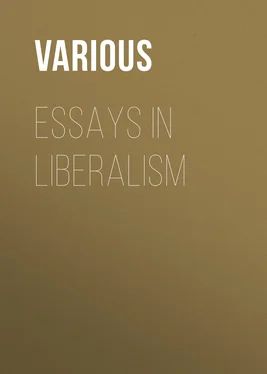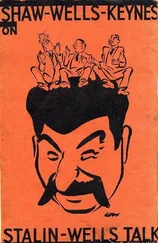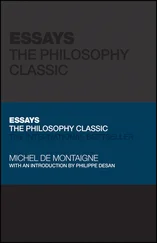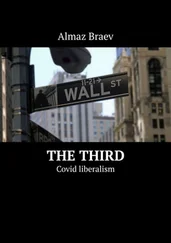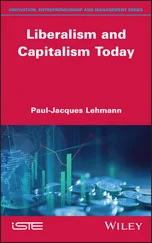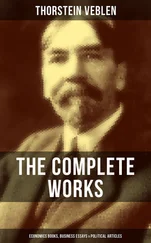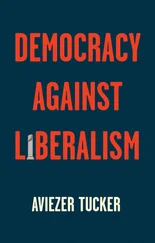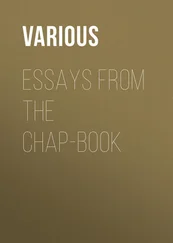Various - Essays in Liberalism
Здесь есть возможность читать онлайн «Various - Essays in Liberalism» — ознакомительный отрывок электронной книги совершенно бесплатно, а после прочтения отрывка купить полную версию. В некоторых случаях можно слушать аудио, скачать через торрент в формате fb2 и присутствует краткое содержание. Жанр: foreign_edu, Политика, на английском языке. Описание произведения, (предисловие) а так же отзывы посетителей доступны на портале библиотеки ЛибКат.
- Название:Essays in Liberalism
- Автор:
- Жанр:
- Год:неизвестен
- ISBN:нет данных
- Рейтинг книги:4 / 5. Голосов: 1
-
Избранное:Добавить в избранное
- Отзывы:
-
Ваша оценка:
- 80
- 1
- 2
- 3
- 4
- 5
Essays in Liberalism: краткое содержание, описание и аннотация
Предлагаем к чтению аннотацию, описание, краткое содержание или предисловие (зависит от того, что написал сам автор книги «Essays in Liberalism»). Если вы не нашли необходимую информацию о книге — напишите в комментариях, мы постараемся отыскать её.
Essays in Liberalism — читать онлайн ознакомительный отрывок
Ниже представлен текст книги, разбитый по страницам. Система сохранения места последней прочитанной страницы, позволяет с удобством читать онлайн бесплатно книгу «Essays in Liberalism», без необходимости каждый раз заново искать на чём Вы остановились. Поставьте закладку, и сможете в любой момент перейти на страницу, на которой закончили чтение.
Интервал:
Закладка:
That opened up a new line of approach for the attack on this problem from the military and air standpoint. And the next development took place in February this year at the meeting of the Temporary Mixed Commission on armaments, when the Esher proposals were presented. There has been a great deal of talk about the Esher proposals, and I am glad of it, because the one thing wanted in this question is public interest. The Esher proposals were an endeavour to apply to land armaments this principle of reduction on a great ratio. And the line taken was this. It was necessary to find some unit in land armaments which corresponded with the battleships, and the unit selected by Lord Esher was the 300,000 regular soldiers of the peace armies in France, England, and Spain. It was selected because it happened to be the number to which the Austrian army was reduced by treaty, and with that unit he proposed a ratio for the armies of Europe, which would leave everybody relatively in much the same position as before, but would obtain an immediate reduction in numbers of standing armies and a great reduction of expenditure.
This proposal was subjected to a great deal of criticism, and I am sorry to say nine-tenths of the criticism appears to emanate from persons who have never read the proposal at all. It is a proposal which lends itself to a great deal of criticism, and the most effective criticism which could have been applied at the time it was presented was that it put the cart before the horse, and approached the problem from the wrong direction, for, as Lord Robert Cecil has said here this morning, what nations require is security. Some of them have clear ideas as to the way of obtaining it, but they all want it, and before you can expect people to reduce their armaments, which are, after all, maintained mainly for the purpose of providing security, you must give them something that will take the place of armaments.
A General Defensive Pact
In June an important development took place in this Temporary Commission. It was increased by the addition of a number of statesmen, and, amongst others, of men who ought to have been on it long ago. Lord Robert Cecil was added, and he at once proceeded to remedy what was a real difficulty in Lord Esher’s proposals. He put forward a plan for providing security in the form, as the Assembly of the League had asked, of a definite written proposal—really a brief treaty. The purport of that treaty is included in the form of resolutions, which are roughly as follows:—No scheme for the reduction of armaments can be effective unless it is general; that in the present state of the world no Government can accept the responsibility for a serious reduction of armaments unless it is given some other equally satisfactory guarantee of the safety of its country; such guarantee can only be found in a general defensive agreement of all the countries concerned, binding them all to come to the assistance of any one of them if attacked.
A general defensive pact, with a proviso! It is obviously unreasonable to expect the States of the American continent to be ready to come over at any moment to help in Europe. It is obviously unreasonable to expect the States of Europe to bind themselves to come and fight in Asia. Therefore, there was this proviso added that an obligation to come to the assistance of the attacked country should be limited to those countries which belonged to the same quarter of the globe. Thus, you see, you are getting the obligation of the League into regional application. Personally my own conviction is that this is the line upon which many of the functions of the League will develop.
The main point of the situation as it is to-day is that you have got a committee working out in detail a general pact, which when it is formulated will be far more complete and satisfactory than the very general and vague Clause 10 of the Covenant. We have reached the position when practical proposals are beginning to emerge. What more is wanted? How can we help on this work? You will have gathered from what I said that it is my own conviction that with this problem of reduction of armaments is so closely linked up the problem of economic reconstruction and reparations that the whole ought to be taken together. I believe one of the reasons why so little progress has been made is that the economic problems have been entrusted, with the blessing of our and other Governments, to perambulating conferences, while the disarmament problem has been left solely to the League of Nations. I believe if you could get the whole of these problems considered by one authority—and there is one obvious authority—progress would be far more rapid.
There is another matter which concerns us as citizens—the attitude of our own Government to this question. I was delighted to see recently an announcement made by a Minister in the House of Commons that the Government was seriously in favour of a reduction of armaments on a great ratio. I was delighted to read the other day a speech, to which reference has already been made, by the Prime Minister. We have had a great many words on this question. The time has come for action, and quite frankly the action of our Government in the past two years with regard to this question has been neutral, and not always one of benevolent neutrality. Our official representatives at Geneva have been very careful to stress the difficulties, but up to the present I am unaware that our Government has ever placed its immense resources as regards information at the disposal of the one Englishman who has been striving with all his power and knowledge to get a definite solution. I believe there is going to be a change; I hope so. In any case, the best thing we can do is to see that it is changed, and that Lord Robert Cecil is not left to fight a lone battle.
The Appeal to Public Opinion
There is something more. There is something wanted from each of us. Personally, I am convinced myself that this problem is soluble on the lines by which it is now being approached. I speak to you as a professional who has given some study to the subject. I am convinced that on the lines of a general pact as opposed to the particular pact, a general defensive agreement as opposed to separate alliances, followed by reduction on a great ratio, the practicability of which has been proved at Washington, a solution can be reached. Given goodwill—that is the point. At the last Assembly of the League of Nations a report was presented by the Commission, of which Lord Robert Cecil was a member, and it wound up with these words: “Finally, the committee recognises that a policy of disarmament, to be successful, requires the support of the population of the world. Limitation of armaments will never be imposed by Governments on peoples, but it may be imposed by peoples on Governments.“ That is absolutely true. How are we going to apply it? Frankly, myself, I do not see that there is a great deal of value to be got by demonstrations which demand no more war. I have every sympathy with their object, but we have got to the stage when we want to get beyond words to practical resolutions. We want definite concrete proposals, and you won’t get these merely by demonstrations. They are quite good in their way, but they are not enough. What you want in this matter is an informed public opinion which sees what is practical and insists on having it.
I am speaking to you as one who for a great many years believed absolutely that preparation for war was the means of securing peace. In 1919—when I had a little time to look round, to study the causes of the war and the events of the war—I changed my opinion. I then came quite definitely to the conclusion that preparation for war, carried to the point to which it had been carried in 1914, was a direct cause of war. I had to find another path, and I found it in 1919. Lord Robert may possibly remember that in the early days of the Peace Conference I came to him and made my confession of faith, and I promised to give him what little help I could. I have tried to keep my promise, and I believe this vital problem, upon which not only the economic reconstruction of Europe and the future peace of the world, but also social development at home depend, can be solved provided you will recognise that the problem is very complex; that there is fear to be overcome; that you are content with what is practical from day to day, and accept each practical step provided it leads forward to the desired goal. I therefore most earnestly trust that the Liberal party will take this question up, and translate it into practical politics. For that is what is required.
Читать дальшеИнтервал:
Закладка:
Похожие книги на «Essays in Liberalism»
Представляем Вашему вниманию похожие книги на «Essays in Liberalism» списком для выбора. Мы отобрали схожую по названию и смыслу литературу в надежде предоставить читателям больше вариантов отыскать новые, интересные, ещё непрочитанные произведения.
Обсуждение, отзывы о книге «Essays in Liberalism» и просто собственные мнения читателей. Оставьте ваши комментарии, напишите, что Вы думаете о произведении, его смысле или главных героях. Укажите что конкретно понравилось, а что нет, и почему Вы так считаете.
